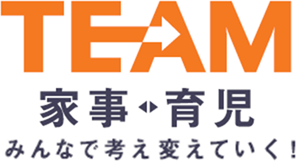The world is made up of someone’s job. and “If you are looking for a part-time job, Town Work. Copywriter Satoshi Umeda has been at the forefront of the advertising industry, creating memorable copy such as “The World is Made of Somebody’s Work” and “If You Want a Part-Time Job, Town Work. His book, “I named the nameless chores that never end, and was surprised at how many there are” (Sanmark Publishing Co., Ltd.), is a collection of copy that includes the words “I’ve never done it before. (Sanmark Publishing Co., Ltd.) has attracted a lot of sympathy from people who were bothered by “nameless household chores.
We asked Mr. Umeda, a popular copywriter, about how he came to focus on the “nameless chore” and how he came up with the name.
(*The Tokyo Metropolitan Government solicited nicknames for childcare leave and decided on “Ikugyo” in an effort to change the mindset of society to think of “childcare leave” not as a period of time off work, but as a period of time to nurture children, who are a treasure of society. In this article, “childcare leave” is referred to as “育業.”)
I was doing housework and before I knew it, the day was over.
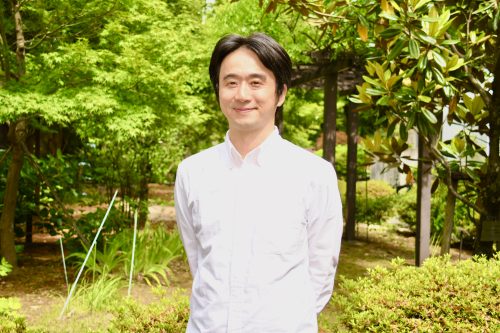
I was working for an advertising agency when my first child was born in 2016 and I nursed the child for 4.5 months. The first month of the childcare period was fresh and fun, but I gradually felt stagnant. When I thought about why, I realized that the “nameless chore” was the cause.
You’ve been home all day, what have you been doing?”
Have you ever been asked like this by your partner? It is only at times like this that we get embarrassed because we can’t explain what we were doing.
The copywriter’s real job is to put into words what everyone is thinking but has not yet verbalized. When we think of housework, we think of cooking, laundry, and cleaning, but in fact, there is so much more. In fact, there are many more. Even though we think we know what we are doing in our heads, by experiencing firsthand how hard it is and how many chores there are, we realized that these unnamed chores are not only a problem for our family, but also a problem for society as a whole. I thought that if we put a name to each of these things, we could fill the gap regarding the “nameless chores” that are “too detailed to explain” or “too difficult to convey.
The “natural” should be appreciated more.
When I arrived at work after a day of childcare, I fell asleep as if I were going to collapse in my office. In addition to the detailed housework, raising a newborn baby made me feel nervous that I was “taking care of life. The company is a tough job, but it is a job that I am used to doing, so I guess I just relaxed and thought, “I feel more at ease at work” (laughs).
(Laughs.) I once wrote in a Georgia copy, “The world is made up of someone else’s work. I wrote, “The world is made of someone’s work,” and I thought it was the same with home. The reason I am able to spend time at home without feeling stress is because someone in the house is taking care of that stress for me. I realized that it is actually a wonderful thing to be able to relax in a tidy room with a meal ready when I return home, and I have an overwhelming respect for wives and those who take care of the housework and childcare.
Even with convenience, “nameless chores” are created.
In the book, which is based on his experiences in childcare, he names 70 “nameless chores” common to many people and introduces them along with cartoons. Particular favorites are “re-positioning,” “making way,” and “re-delivery curfew. Even as the world becomes more convenient, new chores are born from them, aren’t they?
Named “Re-Positioning.”
Household chore of returning last night’s washed dishes in the draining basket back into place, checking for water droplets.
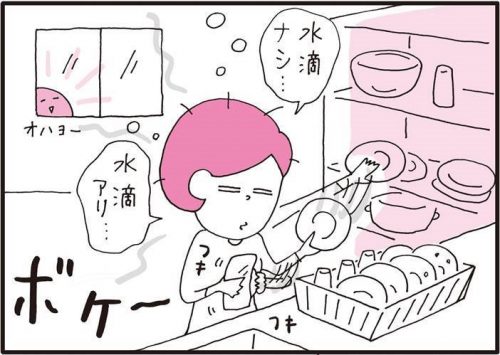
Named “Road Building
Household chores such as evacuating items on the floor onto a table or other surface before vacuuming with the robot.
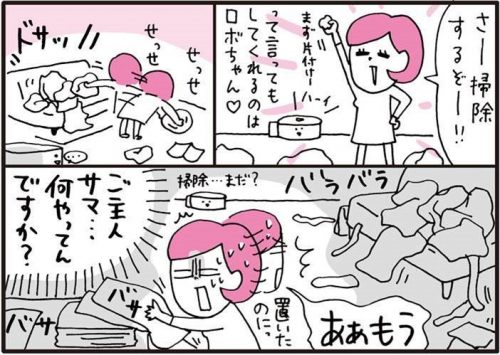
Named “Redelivery Curfew
Household chores to be rushed home at the re-delivery time specified by you.
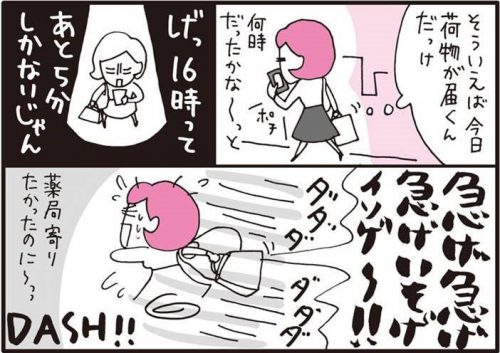
A comfortable environment is built on someone’s kindness.
Remote work has become more common these days, but if you have a remote meeting in the living room, for example, everyone in the family has to be quiet. This increases the difficulty of household chores because it creates a consideration that you have to do them in a stealthy manner. I would like people to think, “They are thinking about it.
For example, if you have small children, you can do chores such as “preparing dinner so that the people in the meeting don’t notice,” or “taking care of the children so they don’t make a fuss. Isn’t this kindness and consideration? If you don’t care about anything, you can cook and clean with a bang. Housework includes various invisible elements such as “thinking chores,” “decision-making chores,” and “caring chores. I want people to understand that the comfortable environment of having a quiet remote meeting is built on someone’s kindness.
Ideally, housekeeping issues should be communicated with an element of entertainment.
Do you find that talking about housework between couples can be disconcerting? I feel that housework issues are deep-rooted, and that’s why I think there needs to be an element of entertainment.
In the past, during a morning information program, I named the “problem of a little bit of leftover barley tea left in the refrigerator,” which occurs frequently in the summer, “1 centimental. Then, when I gave it a name, I could think, “Oh, another 1-centimeter mentality. That is the power of words, isn’t it? If you name a troublesome chore, you become attached to it, and if it has a clever name, you may be able to laugh it off.
The important thing when talking about housework is to be objective and factual. Rather than denying, refuting, or lecturing anyone, I think the ideal style of communication about housework is to convey facts with an element of entertainment. For example, “Look, I’m doing ‘road building’ again.”
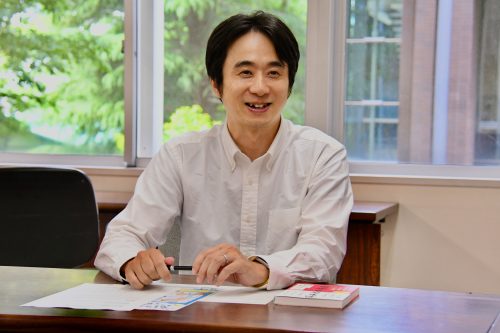
The “nameless chore” is interesting only because it is expressed as it is
The phrase “housework with no name” was originally proposed by Daiwa House, and although it has become popular among a certain number of people, it still lacks recognition. It would definitely be better if everyone knew the term, even if it means noticing someone’s kindness and spreading a wave of appreciation.
The Tokyo Metropolitan Government is looking for catch phrases and episodes to promote “nameless chores,” but there is no need to be bizarre; it is important to express the facts honestly. How detailed can you describe the chores? The more detailed the description, the more people will say, “I totally understand! The more detailed your description is, the more you will attract the sympathy of others, who will say, “I totally understand! I hope that this empathy and laughter will support someone and make society easier for everyone to live in.
Please send us your real daily life stories in words, aiming for 100% recognition of “nameless chores!
Mr. Umeda participated as a judge! Tokyo Metropolitan Government solicited everyone’s voices and ideas about “Housework with No Name”!

Mr. Satoshi Umeda
Copywriter, Professor of Entrepreneurship at Musashino University, whose X (formerly Twitter) post “What I felt after taking 4 months of maternity leave” made a huge splash in April 2019, with a total PV of over 12 million. He is the author of the book, “I Named the Nameless Housework That Never Ends and Was Surprised at the Number of Things I Did.” (Sanmark Publishing Co., Ltd.) “‘I can put it into words’ is a weapon. (Nihon Keizai Shimbun Publishing Inc.)


I named the nameless chores that never get done and was amazed at how many there are.” by Satoshi Umeda (Sanmark Publishing Co., Ltd.)

